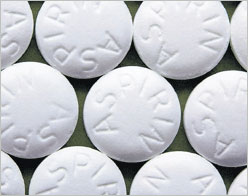An aspirin a day keeps cancer at bay
Reuters
 London, 23 March 2012: Three new studies published on Wednesday added to growing scientific evidence suggesting that taking a daily dose of aspirin can help prevent, and possibly treat, cancer.
London, 23 March 2012: Three new studies published on Wednesday added to growing scientific evidence suggesting that taking a daily dose of aspirin can help prevent, and possibly treat, cancer.
Previous studies have found that daily aspirin reduces the long-term risk of death due to cancer, but until now the shorter-term effects have been less certain - as has the medicine’s potential in patients already diagnosed with cancer.
The new studies, led by Peter Rothwell of Britain’s Oxford University, found that aspirin also has a short-term benefit in preventing cancer, and that it reduces the likelihood that cancers will spread to other organs by about 40 to 50 per cent.
“These findings add to the case for use of aspirin to prevent cancer, particularly if people are at increased risk,” Rothwell said.
“Perhaps more importantly, they also raise the distinct possibility that aspirin will be effective as an additional treatment for cancer - to prevent distant spread of the disease.”
This was particularly important because it is the process of spread of cancer, or “metastasis”, which most often kills people with the disease, he added.
Aspirin, originally developed by Bayer, is a cheap over-the-counter drug generally used to combat pain or reduce fever.
The drug reduces the risk of clots forming in blood vessels and can therefore protect against heart attacks and strokes, so it is often prescribed for people who already suffer with heart disease and have already had one or several attacks.
Aspirin also increases the risk of bleeding in the stomach to around one patient in every thousand per year, a factor which has fuelled an intense debate about whether doctors should advise patients to take it as regularly as every day.
Last year, a study by British researchers questioned the wisdom of daily aspirin for reducing the risk of early death from a heart attack or stroke because they said the increased risk of internal bleeding outweighed the potential benefit.
Other studies, including some by Rothwell in 2007, 2010 and 2011, found that an aspirin a day, even at a low dose of around 75 milligrams, reduces the long-term risk of developing some cancers, particularly bowel and oesophageal cancer, but the effects don’t show until eight to 10 years after the start of treatment.
Rothwell, whose new studies were published in The Lancet and The Lancet Oncology journals on Wednesday, said this delay was because aspirin was preventing the very early development of cancers and there was a long time lag between this stage and a patient having clinical signs or symptoms of cancer.




 Write Comment
Write Comment E-Mail To a Friend
E-Mail To a Friend Facebook
Facebook Twitter
Twitter  Print
Print 














